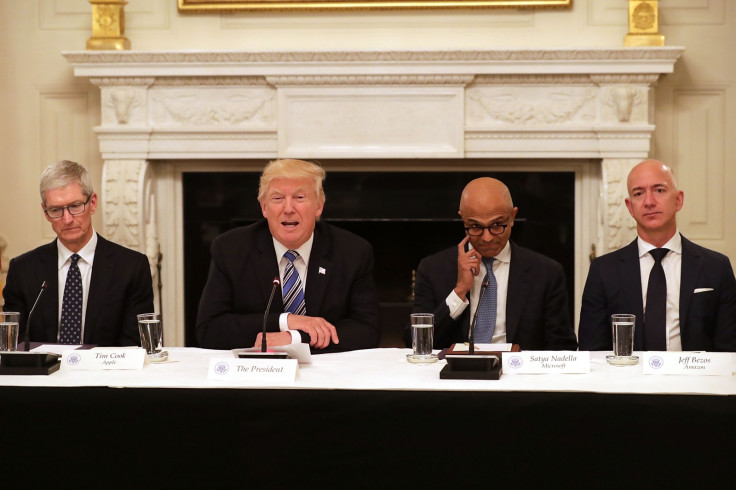Mark Zuckerberg skips White House meeting as Trump calls for 'transformation' of ageing government tech
The meeting kicked off a week of discussions about modernising the government's systems.

Some of the biggest names in Silicon Valley descended on the White House on Monday (19 June) for the first meeting of the American Technology Council. Top tech executives including Apple's Tim Cook, Microsoft's Satya Nadella, Amazon's Jeff Bezos and Oracle co-CEO Safra Catz were among 18 tech executives and investors who met the Trump administration to discuss a potential upgrade of the government's computing systems.
The day-long meeting kicked off a week of working sessions and conversations about modernising the government's systems, cybersecurity, the H-1B visa programme, talent recruitment and other issues.
Facebook CEO Mark Zuckerberg and COO Sheryl Sandberg, who attended the Trump Tower meeting in December, gave the latest meeting a miss. A Facebook spokesperson told Axios that the social media company did receive an invite but declined due to "prior scheduling conflicts".
Trump's senior adviser and son-in-law Jared Kushner welcomed the executives to the White House saying: "We will unleash the creativity of the private sector to provide citizen services in a way that has never happened before."
Kushner, who heads the White House Office of American Innovation, said most of the government's costly 6,100 data centres can be consolidated and moved to the cloud. He also noted that some Pentagon legacy systems still rely on floppy disks.
The federal government spends more than $80bn in IT every year, excluding classified operations, according to a 2016 US Government Accountability Office report.
The tech roundtable comes as the second one for many Silicon Valley executives since the presidential election and highlights the sector's complicated relationship with the Trump administration.
"Our goal is to lead a sweeping transformation of the federal government's technology that will deliver dramatically better services for citizens," Trump said. "Government needs to catch up with the technology revolution. We're going to change that with the help of great American businesses like the people assembled.
"We have approximately $3.5 trillion of market value in this room — but that's almost the exact number that we've created since my election," he said to laughter from the attendees.
Also missing at the meeting was Elon Musk, CEO of Tesla and SpaceX, who recently quit Trump's economic advisory council after Trump decided to pull the US out of the Paris climate accord - a move that many tech executives criticised. Uber's Travis Kalanick, who stepped down from the council earlier this year following protests by employees and users, also did not attend.
Executives who attended the summit included IBM chief executive Ginni Rometty, Mastercard CEO Ajay Banga, Intel CEO Brian Krzanich, Qualcomm's Steven Mollenkopf and Peter Thiel of the Founders Fund.
In an interview with CNN, Republican Governor Rick Scott from Florida said executives who did not attend the meeting "missed out".
"I think it's a missed opportunity. I think it's important to sit down with the President and tell him what you think", Scott said. "If you care about the direction of this country, if you have the opportunity to go to the White House and sit down with the president of the United States, whether it's a Republican or Democrat, show up."
"Show up and tell him what you believe. Look, no one is going to agree with everything you do, none of us do. But I would be there, I would show up and I would talk about what I care about."
At the White House today we made the case for why healthy high-skilled immigration & investments in education are good for the country.
— Brad Smith (@BradSmi) June 19, 2017
White House officials said they did not face any reluctance from the tech sector to participate in the event, Reuters reports. They added that they had to turn away some tech executives from the event due to lack of space.
"This is a double-edged sword for the tech CEOs because they don't want to be window dressing and used for photo ops," Jeffrey Sonnenfeld, associate dean at the Yale School of Management, told the New York Times. "But on the other side, this is the most business-friendly administration since Eisenhower and is much more open than any administration to influence on the spot."
© Copyright IBTimes 2025. All rights reserved.





















